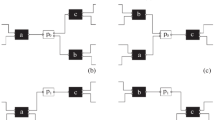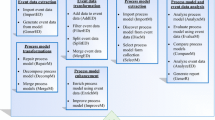Abstract
In the domain of Business Process Management and Workflow Management Systems, the log of work transactions executed has been found to be a useful artifact. The ideas, work, and literature on workflow mining have been primarily concerned with examining the workflow event log to rediscover control flow. Workflow mining has generally been defined as “the process of extracting a workflow model from a log of executions of activities”. In fact, most of the literature specifically and narrowly is concerned with rediscovering the precedence relations amongst activities. It is generally a hidden assumption that all activities are known a priori because they are listed by label in the workflow event log. In this position paper, we explore the possibility of removing this assumption, and thus performing workflow discovery rather than precedence rediscovery. Workflow discovery does not assume that process structure or even activities are known a priori and is concerned with discovering a wholistic perspective of workflow.
Workflow management systems are people systems that must be designed, deployed, and understood within their social and organizational contexts. Thus, we argue in this document that there is a need to expand the concept of workflow mining beyond the behavioral perspective to encompass the social, organizational, and activity assignment perspectives; as well as other perspectives. To this end, we introduce a general framework and meta-model for workflow discovery, and show one approach to workflow discovery in a multidimensional perspective.
Access this chapter
Tax calculation will be finalised at checkout
Purchases are for personal use only
Preview
Unable to display preview. Download preview PDF.
Similar content being viewed by others
References
Agrawal, R., Gunopulos, D., Leymann, F.: Mining process models from workflow logs. In: Schek, H.-J., Saltor, F., Ramos, I., Alonso, G. (eds.) EDBT 1998. LNCS, vol. 1377, pp. 469–483. Springer, Heidelberg (1998)
Cook, J.E., Wolf, A.L.: Discovering models of software processes from event-based data. ACM Trans. Softw. Eng. Methodol. 7(3), 215–249 (1998)
Cook, J.E., Wolf, A.L.: Event-based detection of concurrency. In: SIGSOFT 1998/FSE-6: Proceedings of the 6th ACM SIGSOFT International Symposium on Foundations of Software Engineering, pp. 35–45. ACM Press, New York (1998)
Dustdar, S.: Caramba - a process-aware collaboration system supporting ad hoc and collaborative processes in virtual teams. Distrib. Parallel Databases 15(1), 45–66 (2004)
Dustdar, S., Hoffmann, T., van der Aalst, W.: Mining of ad-hoc business processes with teamlog. Data Knowl. Eng. 55(2), 129–158 (2005)
Ellis, C.A.: Information control nets: A mathematical model of information flow. In: SIGMETRICS 1979: Proceedings of the 1979 ACM SIGMETRICS Conference on Simulation, Measurement and Modeling of Computer Systems, pp. 225–240. ACM Press, New York (1979)
Ellis, C.A.: Formal and informal models of office activity. In: IFIP Congress, pp. 11–22 (1983)
Greco, G., Guzzo, A., Manco, G.: Mining and reasoning on workflows. IEEE Transactions on Knowledge and Data Engineering, Senior Member-Domenico Sacca 17(4), 519–534 (2005)
Herbst, J.: A Machine Learning Approach to Workflow Management. In: Lopez de Mantaras, R., Plaza, E. (eds.) ECML 2000. LNCS, vol. 1810, pp. 183–194. Springer, Heidelberg (2000)
Jablonski, S., Bussler, C.: Workflow Management: Modeling Concepts, Architecture, and Implementation. International Thomson Computer Press (1996)
Kim, K.-H., Ellis, C.A.: Workflow performance and scalability analysis using the layered queuing modeling methodology. In: GROUP 2001: Proceedings of the 2001 International ACM SIGGROUP Conference on Supporting Group Work, pp. 135–143. ACM Press, New York (2001)
Malone, T.W., Grant, K.R., Lai, K.-Y., Rao, R., Rosenblitt, D.: Semistructured messages are surprisingly useful for computer-supported coordination. ACM Trans. Inf. Syst. 5(2), 115–131 (1987)
Schimm, G.: Mining exact models of concurrent workflows. Comput. Ind. 53(3), 265–281 (2004)
Silva, R., Zhang, J., Shanahan, J.G.: Probabilistic workflow mining. In: KDD 2005: Proceeding of the Eleventh ACM SIGKDD International Conference on Knowledge Discovery in Data Mining, pp. 275–284. ACM Press, New York (2005)
Suchman, L.A.: Plans and situated actions: the problem of human-machine communication. Cambridge University Press, New York (1987)
Tan, P.-N., Steinbach, M., Kumar, V.: Introduction to Data Mining. Addison-Wesley, Reading (2005)
van der Aalst, W.M.P., de Medeiros, A.K.A., Weijters, A.J.M.M.: Genetic Process Mining. In: Ciardo, G., Darondeau, P. (eds.) ICATPN 2005. LNCS, vol. 3536, pp. 48–69. Springer, Heidelberg (2005)
van der Aalst, W.M.P., Song, M.S.: Mining Social Networks: Uncovering Interaction Patterns in Business Processes. In: Desel, J., Pernici, B., Weske, M. (eds.) BPM 2004. LNCS, vol. 3080, pp. 244–260. Springer, Heidelberg (2004)
van der Aalst, W.M.P., van Dongen, B.F., Herbst, J., Maruster, L., Schimm, G., Weijters, A.J.M.M.: Workflow mining: a survey of issues and approaches. Data Knowl. Eng. 47(2), 237–267 (2003)
van der Aalst, W.M.P., Weijters, T., Maruster, L.: Workflow mining: Discovering process models from event logs. IEEE Transactions on Knowledge and Data Engineering 16(9), 1128–1142 (2004)
Wainer, J., Kim, K., Ellis, C.A.: A Workflow Mining Method Through Model Rewriting. In: Fukś, H., Lukosch, S., Salgado, A.C. (eds.) CRIWG 2005. LNCS, vol. 3706, pp. 184–191. Springer, Heidelberg (2005)
Author information
Authors and Affiliations
Editor information
Editors and Affiliations
Rights and permissions
Copyright information
© 2006 Springer-Verlag Berlin Heidelberg
About this paper
Cite this paper
Ellis, C.A., Rembert, A.J., Kim, KH., Wainer, J. (2006). Beyond Workflow Mining. In: Dustdar, S., Fiadeiro, J.L., Sheth, A.P. (eds) Business Process Management. BPM 2006. Lecture Notes in Computer Science, vol 4102. Springer, Berlin, Heidelberg. https://doi.org/10.1007/11841760_5
Download citation
DOI: https://doi.org/10.1007/11841760_5
Publisher Name: Springer, Berlin, Heidelberg
Print ISBN: 978-3-540-38901-9
Online ISBN: 978-3-540-38903-3
eBook Packages: Computer ScienceComputer Science (R0)




